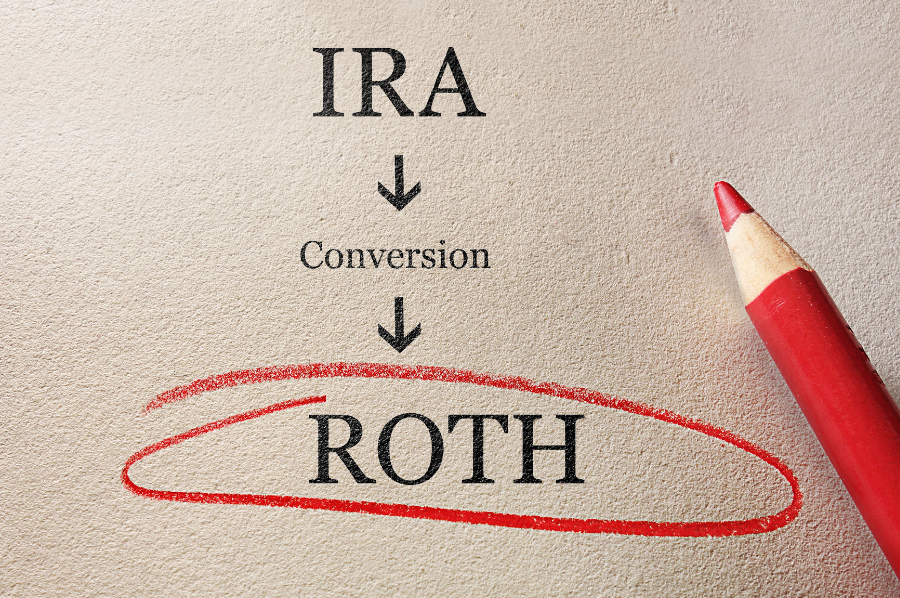


October 11, 2022
Saving for your financial future is one of the most important responsibilities that you have. To ensure that you are able to reach your long-term financial goals, there are several tax-advantaged retirement accounts to take advantage of. These include 401ks, traditional IRAs, and Roth IRAs.
While each retirement account option has benefits, the way taxes are treated varies from one type of account to the next. With a traditional IRA and 401k, contributions that you make can be done on a pre-tax basis. This can reduce your tax liability at the end of the year. However, when you make distributions from the plan upon retirement, it will be treated as normal income when it comes to taxes.
With a Roth IRA, your contributions will be made on a post-tax basis. However, when you retire, you will not be taxed on any of the money you take out of the account. Due to the differences in taxation, it could make sense to roll some of your money out of a traditional IRA or 401k into a Roth IRA.
If you have funds in a traditional IRA or 401k and want to put more into a Roth IRA, there is a process you can follow that will allow you to do this. This process is called a Roth IRA conversion. It will require you to pay taxes on the money you want to transfer. Once the funds are in the Roth, they will not be taxed again. It is important to consider the advantages and disadvantages of a Roth IRA conversion to determine if it is right for you and your situation.
Transferring funds from a traditional IRA to a Roth can be a good idea in some situations. There are various advantages of this financial move to consider.
One of the advantages of a conversion is that you can enjoy having funds in a tax-free account. Once the money is taxed, the net proceeds sitting in the account will never be taxed again. This includes any money you make on investments. Having funds that are free of taxes will provide you with a clearer picture of your financial situation and can provide peace of mind as well.
When it comes to traditional IRAs and 401ks, not having to pay taxes on your contributions is a benefit. However, you will eventually need to pay taxes on this money. To ensure that this money is eventually taxed, the IRS imposes required minimum distributions (RMDs), which typically start when you are around 72 years of age. This provides you with less control over when you can sell your investments and pay taxes.
401ks are a popular employee benefit. In many cases, employers will also provide a match as an additional contribution to help encourage employees to save even more. While there are benefits that come with 401ks, one of the disadvantages is that you typically are limited in your investments to some pre-selected funds. Once the money is converted to a Roth IRA, you will have far more flexibility to choose investments based on your personal strategy and risk tolerance.
While there are various advantages that can come with converting your funds from a traditional IRA or 401k to a Roth, there are some disadvantages to consider as well.
One of the clearest disadvantages that can come with a Roth IRA conversion is that you will have to pay taxes on the money you withdraw. When you take money out of a 401k or traditional IRA, it will be taxed at your normal income tax rate. Depending on your income at the time, this could be 30% or more of the money you transfer out. Due to this, it is important to be strategic about how much you convert and withdraw each year to manage your tax liability.
It can be an advantage to have your money in an account that will not be taxed. Most people enjoy the conversions under the assumption that taxes will be higher in the future. While that is a risk, it is not a definite possibility. Due to the structure of a marginalized tax rate, the conversion could actually lead to paying more taxes over the long run.
A 401k account today is mostly protected in bankruptcy court. However, IRAs have lower levels of protection. If you believe that you may file bankruptcy in the future, it would be wise to avoid the conversion.
Overall, a 401k conversion can be a smart financial decision as you prepare and plan for retirement. There are various advantages and disadvantages of this financial decision to determine whether it is right for you.
Written By: Heritage Financial Planning Team

If you're like most people, you'll likely be employed at more than one place throughout the duration of your career. It's normal to keep moving onwards and upwards to meet your ever expanding goals....
Read More
Managing your personal finances is very important. For those that budget, save, and invest strategically, there will eventually come a time when they want to start taking withdrawals from their...
Read More
If you're self-employed, then you already know that you're on your own when it comes to the benefits enjoyed by those employed by a company. Between getting a business off the ground and dealing with...
Read More
10440 N Central Expressway
Suite 1540
Dallas, TX 75231
214-446-2100
Site Links